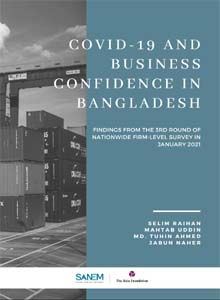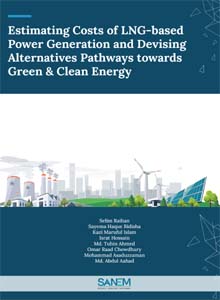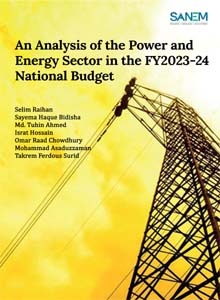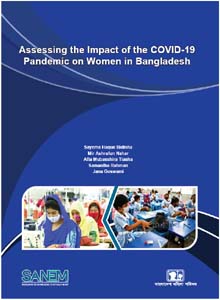
COVID-19 and Business Confidence in Bangladesh: Findings from the 3rd Round of Nationwide Firm-level Survey in January 2021
 Citation: Raihan, S., Uddin, M., Ahmed, M.T., (2020). “COVID-19 and Business Confidence in Bangladesh: Results from the Firm-level Survey in October 2020”, SANEM Publications, Dhaka, Bangladesh.
Citation: Raihan, S., Uddin, M., Ahmed, M.T., (2020). “COVID-19 and Business Confidence in Bangladesh: Results from the Firm-level Survey in October 2020”, SANEM Publications, Dhaka, Bangladesh.
Abstract: Since the first local case of COVID-19 in March and the subsequent lockdown, Bangladesh has been heavily affected by the pandemic – the impact of which has now spanned over the entirety of 2020. Firms in the private sector have struggled and are currently struggling – loss of sales, rise in business costs, decrease in productivity levels, and even permanent shutdowns are some of the issues firms are dealing with. While the end of the lockdown and reopening of businesses, combined with future hopes of a vaccine, have stimulated the economy towards recovery, it will not be sufficient without the implementation of appropriate government policies and close observation of private sector businesses – a major driving force in economic growth. In regards to this, SANEM and The Asia Foundation jointly conducted the third round of the Business Confidence Index (BCI) survey on over 502 firms in Bangladesh in attempts to investigate attitudes and expectations of businesses on profitability, investment, wages, employment, business costs, and sales or exports, amongst others.
Under this study, a total of 502 firms have been surveyed. Out of the 502 surveyed firms, 252 firms were from the manufacturing sector and 250 firms were from the services sector. Seven sub-sectors in the manufacturing industry and eight sub-sectors in the services industry were identified based on Bangladesh’s latest available National Accounts Statistics. The survey covers RMG, Textiles, Pharmaceuticals, Leather and Tannery, Light Engineering, Food-processing, etc. in the manufacturing sector. In the Services sector, this study covers Wholesales, Retails, Restaurants, Transport, ICT and Telecommunications, Financial Sectors, Real Estate, etc. The number of firms to be surveyed for each of the subsectors was chosen based on the sub-sectors’ contribution to the GDP.
Based on the survey responses, this study constructs four indices, namely – (i) Present Business Status Index in October-December 2020 compared to July-September 2020, (ii) Present Business Status Index in October-December 2020 compared to October-December 2019, (iii) Business Confidence Index for January-March 2021 compared to October-December 2020 and (iv) Enabling Business-Environment Index (EBI). The indices are first prepared at the firm level and later aggregated to the sub-sectoral and sectoral level incorporating appropriate weights.
There have been some improvements in overall business status in October-December 2020 compared to the business status in July-September 2020 but that was minimal. However, compared to the status in the same quarter of 2019, recovery is still slow. It shows, the firms have not got back to the pre-pandemic situation, and it might take a while. Sectors are experiencing recovering at varying paces. Faster recovery is taking place in the Pharmaceuticals and Chemicals, Textile, and Financial sectors.
Some of the indicators, such as profitability, employment, and wage indicators have improved slightly compared to the past quarter. However, the business cost indicator worsened in this round of the survey. It shows a serious threat to the viability of the firms in the long run.
The business confidence for January-March 2021 shows some improvement over business confidence in October-December 2020. But still, the overall BCI is low. The overall BCI score for all involved firms rose substantially from the first round to the second round. However, this growth has slowed in the third round, increasing by only about 2.66, making the final score 57.90. Even though every sector except wholesale business experienced an increase of confidence, the extension was nominal in sectors like RMG, textile, food processing, light engineering & real estate.
In this round, a new index namely Enabling Business-Environment Index (EBI) has been introduced. The EBI scores in all three rounds are found between 25 and 50, indicating that the overall business environment is unfavourable for the firms. However, a matter of immediate concern is that the score is decreasing, from a score of 44.61 in the July-September quarter to a score of 43.49 in the October-December quarter of 2020.
71 per cent of the surveyed firms think that Bangladesh is on the path to economic recovery. Out of 502 firms, 16 per cent consider it as a strong recovery, 40 per cent think it as moderate recovery, and 15 per cent perceive it as weak recovery. 17 per cent of micro and small firms in the third round expects strong recovery compared to only 3 per cent in the second round.
In the third round, 22 per cent of firms received stimulus packages compared to 19 per cent in the second round. Among the overall stimulus package recipients, 59 per cent of RMG firms received the package while those from restaurants and other services did not receive it. From the second to third rounds, micro and small firm recipients increased from 8 per cent to 10 per cent while medium firms increased from 20 per cent to 28 per cent. Recipients of the packages faced problems due to lengthy procedures, difficulty in bank services, and procedural application systems. Those who did not receive said that the incentive package is not a grant, no package for the industry, procedural and bank-related difficulties.



